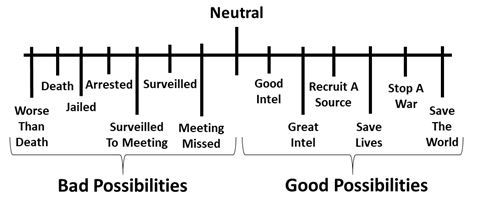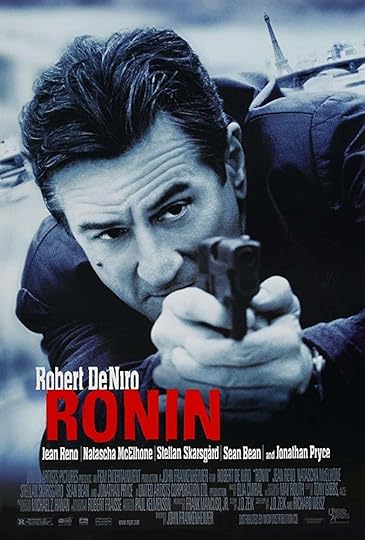John Braddock's Blog
August 13, 2019
The Risk Of Being A Company Founder vs. The Risk Of Being A Venture Capitalist
Boris Wertz of Version One recently put the returns of his investment portfolio up for every one to see.In the comments, there’s a discussion of the risk profiles of Venture Capitalists and Company Founders.Wertz says: “I personally think that being a founder is the much, much harder job — we have a portfolio of companies, a founder only has one! Our losses are being more than outweighed by some of the winners, an option a founder doesn’t have. Venture Capital is definitely harder than it loo...
Published on August 13, 2019 11:52
July 8, 2019
Three Ways To Be Rich
Once upon a time, there was only one way to be rich: Be powerful.If you were powerful, you could take from others. Through force, you could take from others the fruits of their labor. And even if you got rich by luck or skill, such as through a bumper crop or skilled animal breeding or finding gold, you would lose it to someone more powerful. Once upon a time, you had to be powerful to be rich. When you’re taking from others or trying to stop someone from taking from you, you’re playing a Zer...
Published on July 08, 2019 07:16
July 2, 2019
Hoping For A Plan
When you take a risk, you feel it. You feel the anxiety. You feel the fear. You know something could go bad. But you take the risk because it could go well. Which means you feel something more than fear and anxiety: You feel hope. You hope the bad thing doesn’t happen. You hope the good thing does. You hope it goes well. Hope and fear are the two sides of taking risks. But when you’re a spy, you don’t want either one. You don’t want fear, because fear will slow you down. And you want to repla...
Published on July 02, 2019 13:24
Replacing Hope With A Plan
When you take a risk, you feel it. You feel the anxiety. You feel the fear. You know something could go bad. But you take the risk because it could go well. Which means you feel something more than fear and anxiety: You feel hope. You hope the bad thing doesn’t happen. You hope the good thing does. You hope it goes well. Hope and fear are the two sides of taking risks. But when you’re a spy, you don’t want either one. You don’t want fear, because fear will slow you down. And you want to repla...
Published on July 02, 2019 13:24
June 20, 2019
Looking For Risks
To know what risks to manage, you start with the risks that are possible.Past data is great for telling you what’s possible. History gives you an idea of what could happen in the future.In the history of espionage, a lot of things have happened. Some good, a lot bad. Some world-changing, some deadly. Some spies have been executed. Some spies have won wars. If you categorized all the good and bad things spies have faced in history and put them on a scale, it might look like this: On the good si...
On the good si...
 On the good si...
On the good si...
Published on June 20, 2019 09:31
June 16, 2019
A Spy’s Guide To Spy Movies: Ronin
Before I joined, the CIA’s Head of Recruitment recommended I watch Ronin to learn something about the life of a spy. It’s a story set in the years between the Cold War and 9/11, when spies were using old skills to do new things. The new things in Ronin include a chase for a briefcase. The old skills are the planning, execution and reacting to what happens. The main character is Sam, played byRobert De Niro. Playwright David Mamet (credited as Richard Weisz) was brought in to write De Niro’s pa...
The main character is Sam, played byRobert De Niro. Playwright David Mamet (credited as Richard Weisz) was brought in to write De Niro’s pa...
 The main character is Sam, played byRobert De Niro. Playwright David Mamet (credited as Richard Weisz) was brought in to write De Niro’s pa...
The main character is Sam, played byRobert De Niro. Playwright David Mamet (credited as Richard Weisz) was brought in to write De Niro’s pa...
Published on June 16, 2019 07:38
April 5, 2019
Chapter Two of The 24th Name, Part II
The 24th Name, Part II is being released today.Chapter One of the new book has spoilers for Part I (if you haven't read The 24th Name, Part I it's a free download today, so you can start there).So instead of Chapter One of The 24th Name, Part II, here's Chapter Two: ---------My fifth name was for a nuclear bombmaker. It was a brand-new name, so the CIA told me to choose it.When the CIA tells you to choose a new name, they tell you to choose a name unconnected to you, which isn’t easy. Our min...
Published on April 05, 2019 03:28
March 17, 2019
How To Become An Expert On Experts
When you’re a spy, you meet a lot of experts. You meet area experts, scientific and technical experts, and experts on economics, politics, and diplomacy. But experts are everywhere.If you’re in business, you might want an expert in marketing to help you. Or an expert in quality control. Or an expert in product distribution.But how do you judge if they’re really an expert?Most of the time, you rely on two indicators: Credentials in the field you care about and Experience generating the results...
Published on March 17, 2019 18:09
March 8, 2019
The Dominant Game Of Baseball
For most of baseball history, major league scouts were looking for “Five-Tool Players.”To be a Five-Tool Player, you need to be better than most other players in five different categories: Batting average, hitting for power (extra bases), speed, throwing, and fielding.Which is hard. It’s hard to be better than most other major-league players in one of those categories, much less five. Five-Tool Players are some of the best players in baseball history: Hank Aaron, Alex Rodriguez, and Ken Griff...
Published on March 08, 2019 13:33
January 10, 2019
What Does It Take To Make Great Things?
In his 2008 bestseller Outliers, Malcolm Gladwell famously highlighted the 10,000 hour “rule.” The “rule” is that it usually takes 10,000 hours of practice to be an expert at something.One of his examples is the Beatles. Over a four-year period, they played over 1,200 shows in Hamburg, Germany and played for over 10,000 hours together. Then, they were ready to conquer the world, says Gladwell. They had become experts at producing and playing “great” music.But was it the 10,000 hours of playin...
Published on January 10, 2019 12:25



